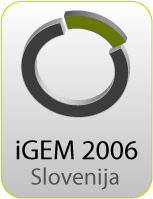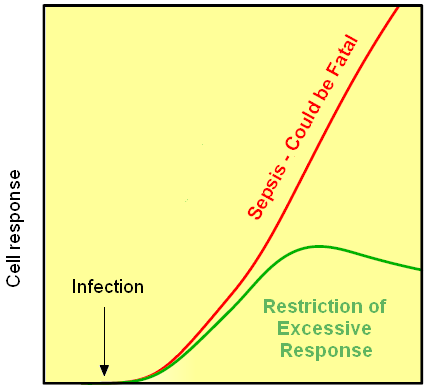Ljubljana, Slovenia 2006
From 2006.igem.org
SAY NO TO SEPSIS
| Background and Signalling Pathway |
|---|
| Project & Model |
| Methods |
| Results & Conclusions |
| Terms & References |
| Team members |
| Mammalian systems can be a subject of cellular engineering similarly to bacterial cells. We decided to tinker with the existing cell signalling network of the response to the bacterial infection. Binding of bacterial components (PAMPs – Pathogen associated molecular patterns) to a family of Toll-like receptors activates the cells of the immune system but the exaggerated response may lead to systemic inflammation and sepsis which is often fatal. We designed a feedback loop, which inhibits the signalling cascade at the »weak spot« - MyD88, a consensus adaptor protein of the Toll-like receptors. A mathematical model of cell activation with engineered feedback loop was constructed, which predicts the decrease of the cellular activation after the repeated stimulation. Twenty-six new BrioBricks were constructed specially for the mammalian system. We have experimentally confirmed the function of the feedback device by detecting the inhibition of cellular activation after the repeated stimulation. Cell activation decreased without completely deleting the responsiveness to the bacterial infection, thus our engineered cell system represents a type of artificial immunotolerance. |
We would like to express our thanks to the Sponsors
| [http://www.ki.si/ http://parts2.mit.edu/wiki/images/9/90/Logo_ki2.jpg] | [http://www.fkkt.uni-lj.si/en/ http://www.fkkt.uni-lj.si/img/menuleft_logo_unilj.gif] | [http://www.lek.si/ http://parts2.mit.edu/wiki/images/0/09/Lek2.jpg] |
and Donators
[http://www.ad-futura.si Ad Futura], [http://www.krka.si/si/ Krka pharmaceutical company], [http://www.mediline.si/ Mediline], Farmadent



